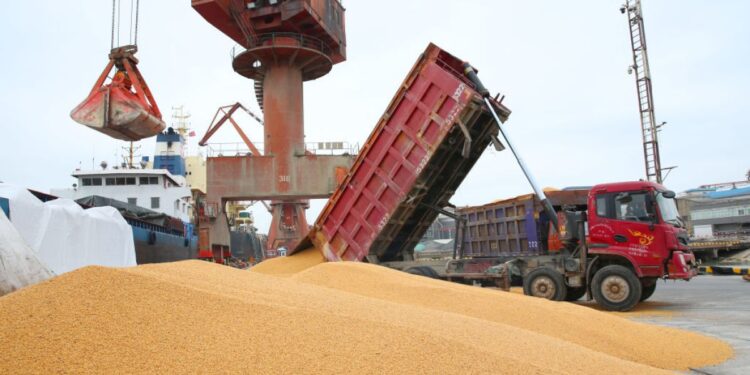The customs duties imposed by the United States and China have motivated the agricultural sector in Brazil, while a heavy blow to American farmers, as Beijing looks to Brazil to obtain a wide range of commodities, from soybeans to beef, according to the British Financial Times in a Sunday report.
Brazil was one of the largest winners in President Donald Trump’s trade war with China in his previous term, and has greatly strengthened its superiority over the United States as the largest food supplier for Beijing, and now it seems that it is ready to increase its superiority, after its exports to China have already increased before Trump raised his customs duties by 145%, and Beijing adds 125%fees.
“It is a blessing for farmers in Brazil and Argentina, and their sector will be strengthened significantly. The repercussions of this matter will be longer than actual procedures. In Asia, countries will strengthen their relations with South America,” said Ishhan Behno,
Brazilian beef sales to China increased by about a third in the first quarter of 2025, compared to the previous year, and China’s poultry imports increased by 19% on an annual basis in March, according to local commercial societies, and at the same time, the external demand witnessed the trading of Brazilian soybeans with a bonus of $ 1.15 for its American counterpart in global markets, after it was sold at a discount of only 25 cents in January.
Unconscious farmers
“China is moving quickly to secure supplies not only from soybeans, but also from other goods. This will lead to a decrease in demand for American grains,” said Rodrigo Alfim.
And American agricultural shipments to China decreased 54% in January compared to the previous year, and the Asian giant usually buys 90% of American atom exports and about half of its exports of soybeans.
The British newspaper quoted Kalb Ragland, soybean farmers from Kentucky, as saying that American farmers “are still suffering” from the effects of Trump’s first trade war in his first period, and “certainly are not enthusiastic about a lengthy second war.”
In an open message, Ragland, President of the American Soybean Association, appealed to Trump to make a deal with China.
https://www.youtube.com/watch?v=jsed62dtief
He wrote: “It is necessary to reach a deal. The agricultural economy is much weaker than it was in its first term. After the first trade war, we lost nearly 10% of the market share in favor of China, a share that we have never prepared.”
And China actually prevented last month a large share of American beef exports to the country, which was estimated last year at 1.6 billion dollars, by not renewing the records that allow hundreds of American meat facilities to export there.
The newspaper quoted a source that it described as familiar with American agricultural exports, as saying that the shipments of soybeans, wheat, corn and chrap this year were limited.
The source added that many Chinese grain grinding companies stopped their imports from the United States, after customs duties reduced their profit margins. He added: “If the situation continues in this manner, the shipments of the grain may reach zero by May … The only way to achieve a natural year is to return customs duties to zero.
Increased demand
Aurelio Pavinso, CEO of SLC Agrícola, one of the largest grain production companies in Brazil, said that the country is in a strong position to take advantage of this transformation, adding: “With China seeking to diversify its suppliers, and Europe’s growing view of Brazil as a stable option, we are witnessing an increase in foreign demand and a remarkable rise in prices.”
The newspaper quoted the CEO of the US Soy Export Council, Jim Sotter as saying that Brazil owes Trump, partly, to help her provide exporters who are able to fill the American void, during the first American trade war with China, the Brazilian soybeans were circulated with a allowance of about 20% compared to American soybeans.
This investment reduced the competitive advantage of the United States, which was based on strong and reliable infrastructure, according to Souter.
The US share of China’s food imports decreased from 20.7% in 2016 to 13.5% in 2023, while Brazil’s share grew from 17.2% to 25.2% in the same period.
The logistical infrastructure in Brazil is still backward from the United States, it often hinders export ports, but the last trade war may again bring a wave of capital (investments), said Eugenio Vegherido, CEO of Ako Port, who was hoping that instability would encourage China to invest in Brazilian logistical services.
European turnout
Europeans, who are awaiting the ratification of a huge free trade agreement between the European Union and Mercosur (the southern joint market that represents countries in South America, including Brazil), may have to shift to obtaining the protein needed for animal feed from Brazil instead of the United States, according to the European Feed Union.
With the intention of the European Union imposing a 25% reprisal duties on soybeans, American beef and poultry meat between April and December, fears are increasing that the country located in South America may not have enough products to meet the demand, and although Brazil has achieved an abundant crop, Souter said that its large supply “will be absorbed quickly” if “has focused on everyone who China and the European Union are all their sources on Brazil.
Pedro Cordero of the European Feed Factors Union said the Europeans share this anxiety.
He said: “We will compete with China, among other countries, for the same products,” which means high feed prices, which means high food prices. He added that if South America does not take this step, “we will make a problem.”



